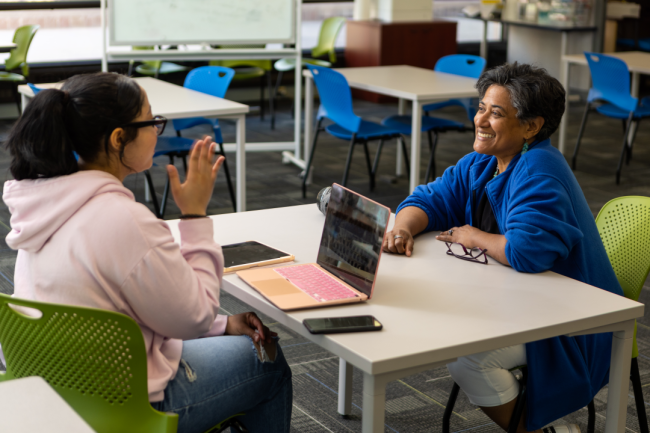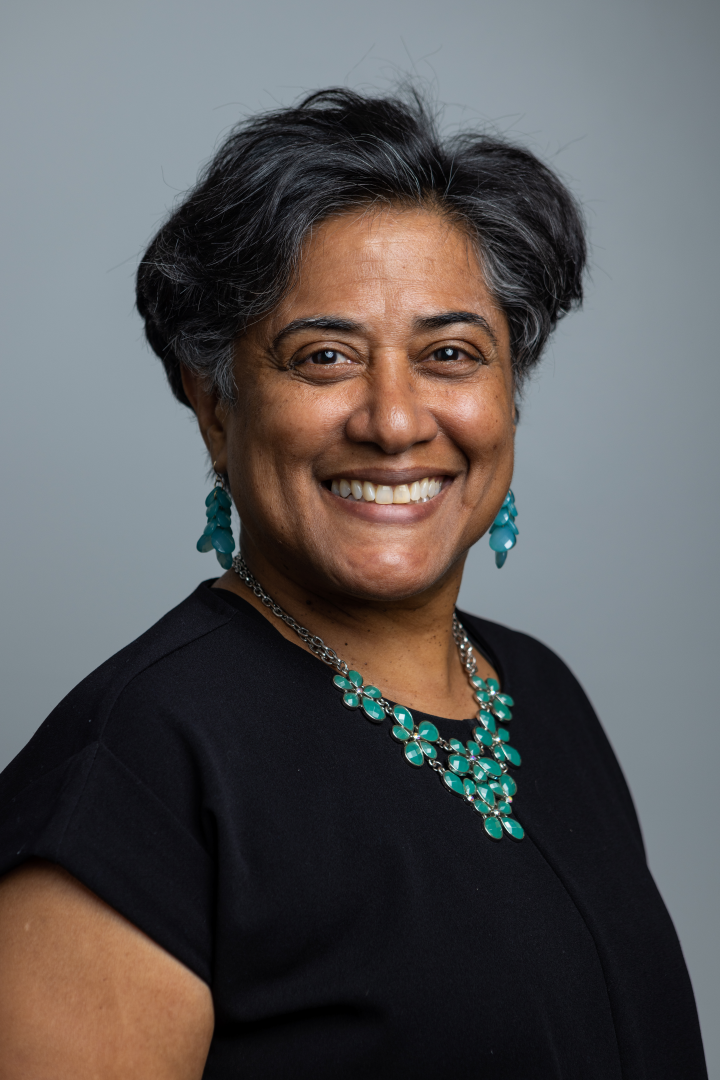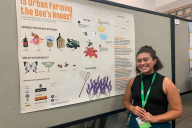You have /5 articles left.
Sign up for a free account or log in.

Mayra Lopez-Perez is one of University at Buffalo’s inaugural student success coaches, providing one-on-one academic support to learners.
Douglas Levere/University at Buffalo
The University at Buffalo launched a student success coaching program in January within its five academic units, the first in the State University of New York system to do so.

Douglas Levere/University at Buffalo
Nine coaches and one program coordinator, Mayra Lopez-Perez, serve as cheerleaders, surrogate parents and academic strategists alongside SUNY Buffalo students to promote their success and engagement across campus.
Lopez-Perez spoke with Inside Higher Ed about her work as the inaugural coaching program coordinator, the pilot program and how the university is gearing up for a full launch of the program for incoming students this fall.
Q: What is the focus of your new role?
A: My role as coordinator of the new student success coaching program mainly works to ensure that all of our nine coaches so far—we’re hoping to get to more—work under the same guise and the same premise.
This is not only new to the campus, but it’s also new to the SUNY system. SUNY has this coaching program, and it’s meant for student success, but it was actually geared more towards professionals. So not only are we the pilot program here on campus, but we’re also the pilot group for [SUNY] to launch into the area of student coaching success.
My job is to ensure that we attend all of the trainings, looking out for other trainings that might become available, just to ensure that we are as well prepared for our job as we can possibly be.
Q: What is the pilot student success coaching program?
A: We started it in January, when the students returned from their winter break.
The program is meant to run for the student’s first year, so we’re supposed to start with a new cohort in the fall. And we follow them and we’re with them all the way to the end of May, once they move on and hopefully become sophomores.
The impetus behind the program is to have somebody there. Students, once they come in … spend [time] acclimating to [their] new environment and trying to figure out, “Where is everything?” and “How do I do this?” We are meant to navigate their first year with them. Sort of like when you go on a cruise, we’re kind of a concierge, we make sure that whatever you need is there for you.
We are meant to meet with our students on a regular basis, just checking in with them, see how they’re doing, how they’re finding the challenge, and give them tips that will make things easier for them.
In the summer, we are hoping to launch a series of presentations that will help the [incoming] students start thinking about, “Oh, I’m going to college; now I’m a college student.” We’re going to be talking about things like College Life 101, time management, study skills, setting goals, but also other things that might be on their radar, like how to make friends and develop social well-being. Because we know that we’re going to have students from all the spectrums, we also do things like “surviving and thriving in college,” to talking about things that might be of concern to the students like food insecurities, or housing challenges, and things like that.
Q: What obstacles have you encountered in this pilot, and how are you pivoting to better support students this fall?
A: Right off the bat … the students saw us as a punitive measure. We started [the pilot] working with those students that were on academic warning; they were the ones that were going to be in greater need. They were all students that started in the fall coming back for their second semester.
It took all of us [coaches] a lot of time to get to know these students and talk them down from that perspective. As we went along, we heard stories of why they didn’t do so well. We listened to them and encouraged them and told them, “You still have time to learn to turn things around, and kudos for you for not giving up and coming back.”
We also work in conjunction with … a course that UB students are encouraged to take, LAI203 [Academic Success Strategies], where they talk about the same topics: some time management, setting SMART goals, some tips on study skills and other things that are meant to help the student.
For those students of ours who are taking the course, we ask them, “Where are you on this? How’s it going? How do you see a difference?” For those that didn’t select to take the course, we talked about those topics that they don’t know.
Q: What kind of impact and outcomes have you seen from students following the pilot?
A: Seven weeks in [to the semester], when I was meeting with my students, I would ask them, “Let’s take stock seven weeks in. Can you compare last semester, several weeks into this semester? Are there any differences? Which one do you prefer?”
What I found most amazing is they talked about how [they are working differently]. There is one student who called it his mapping—“I mapped everything out for myself. And it’s made it so much easier.” Then I ask them, “Well, what do you think is the reason that you’re doing so much better now?"
And they’re like, “Oh, because the mapping and the skills and this and that,” and I’m like, “But what is the true reason that you’re doing so much better now?” … I say, “Could it possibly be you? You turned the corner … because everything that’s happening, I have nothing to do with it. All we do is we talk—we talk about your concerns, your dreams, how you’re going to push forward. But you’re the one actually doing the work.”
It’s so gratifying to see that to see them. All of a sudden, the light goes off.
It helps me then talk to them: “Now that you’ve confronted this first thing, and you’ve been able to change everything, you have the tools, you have the methods, when you keep going forward, you run into another bump in the road, you know exactly what to do.” So that’s been awesome to see.
Q: What’s next for the student success coaching program as it launches officially in the fall?
A: I hope that we get the buy-in from students. Right now, we are actually located within six out of all the departments at the university. And what I hope is that we make such a difference with these brand-new students coming in, mostly for them. But that it makes the program grow.
Our plan is to introduce ourselves to the students over the summer to get them thinking about having a partner there with them to help them develop their plan and a cheerlead to encourage them, and a mom or dad to comfort them when they’re feeling that, no matter what they try, it’s not working. And hopefully have less students, at the end of the first semester, learn the agony of being on academic warning. Hopefully by the end of the full year, have a crop of freshmen that all turn into sophomores because they’ve reached that magical 30-credit number.
Q: What does student success mean to you?
A: When I came to college, I had done really well for myself in high school. I was the first person in my family to come to college, way back when the dinosaurs roamed the earth and I decided to go into Cavemen University.
I wanted to be a photographer. I didn’t understand anything about majors and minors and all that stuff. It turns out that there was no such thing as a photography major, I had to go under Fine Arts. And for Fine Arts, I had to do drawing, sculpting, painting. The only [class] open was drawing, and I literally need a ruler to draw a straight line.
I went to this class, and I did my damnedest, but it just I wasn’t good enough, I was failing. Every assignment, I got a no-go on it. Halfway through, I just said, “I can’t take this anymore. I can’t take the humiliation. I can’t take the embarrassment. I can’t take this professor.” So I stopped going.
For the first time in my life, I got a failing grade. Everything else was A except for this one class, and it was hard … because it didn’t matter how much effort I put in, I couldn’t perform as well as the professor expected me to.
To me, student success is helping the students understand that in life, you’re going to run into situations that you’ve never run before, and never encountered before. And what it takes to succeed is something as little as somebody telling you, “I believe in you; you can do this, don’t give up” and that feeling that despite everything, I am going to give it my best.
So I don’t get an A, maybe I get a D-plus, but that’s still passing. But it doesn’t mean that I have to strive for D-plus for everything. I need to be OK with myself, I need to know that I can do this … But if I don’t give up, if I look for help, if I ask for help, and if I accept the help, and actually put it into practice, that’s what success is.
It’s not just about student success—it’s being successful with life. What our job is, is to help people realize that dream of getting that diploma to succeed and become a college graduate so that way they have opened doors for themselves that they might have not had.
Get more content like this directly to your inbox every morning. Subscribe here.







.jpeg?itok=aGrC82hx)
